Kaveri Online Portal For Getting Encumbrance Certificate In Karnataka
Encumbrance Certificate (EC) Karnataka
In short, the Encumbrance Certificate known as EC is one of the most important documents to validate a property title during the property buying. The Encumbrance Certificate record affirms that the property is free from any legal or monetary dues such as uncleared debts or mortgages. Hence a person procures this document as a free title and proof of ownership.
In November 2018, the Karnataka Government has launched the KAVERI Online services to make the registration process easier. Once all the details of the purchased or rented property are recorded, the documents can be uploaded on the website along with the application. The system will calculate the market value of the property and then the application will be sent to the sub-registrar. Once the application and evaluation is approved, the applicant can pay the applicable stamp duty and registration fee on the website. He/She can book an appointment with the Sub-Registrar to complete the formalities. After that certified copies of property deeds and other such documents can be downloaded from the website.
Process of Obtaining Encumbrance Certificate in Bangalore, Karnataka
In Karnataka, the applicant can get an Encumbrance Certificate in offline or online mode.
Online Procedure:
The Department of Stamps and Registration, Government of Karnataka gives its citizen with the facility to enter details and book appointments for document registration and also allows to seek the required files/records and registered copies of required documents online.
KAVERI Online Service issues Encumbrance Certificate from any Sub-Registrar Office in Bengaluru Urban District.
Here is the step by step process to get an Encumbrance Certificate in Karnataka.
Step 1: To apply online, register on KAVERI online services by visiting its official portal ( https://kaverionline.karnataka.gov.in), and click on ‘Register as User New User’. You have to produce your personal details to register like Name, Date of Birth, Address, PAN, Mobile Number, Email Id, etc. An activation code will be sent to your email ID and an SMS will also come to your mobile number. Input the code and click on the Activate tab. Once this is done, you can easily log into Kaveri online services and change the password.

Step 2: The user registration page appears – register by providing the required details. Enter the captcha and click Register. After login, click on the “Online EC” tab for getting the online EC.

Step 3: Enter the login ID and password and click on the redirected login on the online portal.
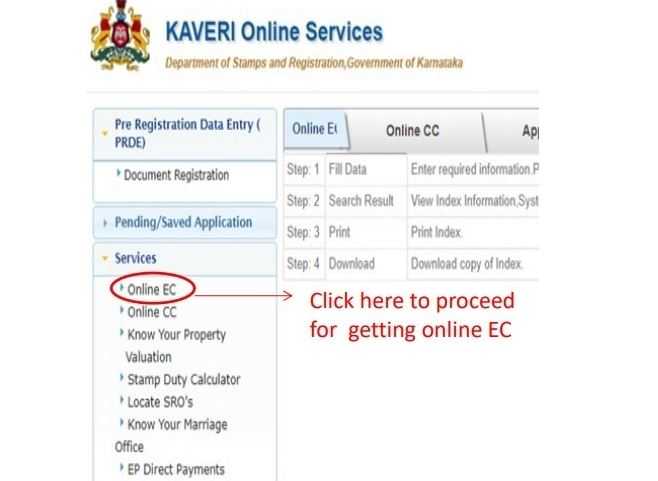
Step 4: Fill in the required data and search for the index of registered documents. View index information displayed.
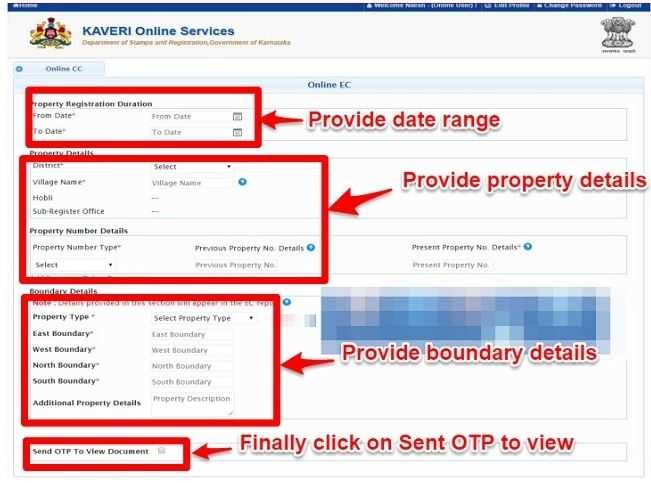
Step 5: Request a digitally signed copy of the online encumbrance certificate and make the necessary payments via Internet banking or credit/debit card. Click Submit when you pay.
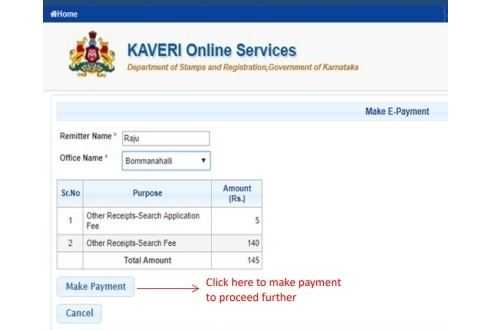
Step 6: Now, request the concerned department. The operator inserts the digital signature of the concerned authority and uploads it to the portal.
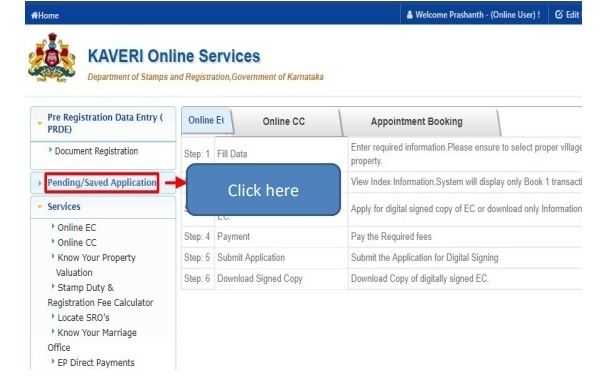
Step 7: On receiving the notification of successful processing, log into the portal, and download a digitally signed copy of the Encumbrance Certificate.
Step 8: Print the downloaded copy to use it for the necessary purpose.
This completes the online process to apply for EC
An EC looks like as below image:
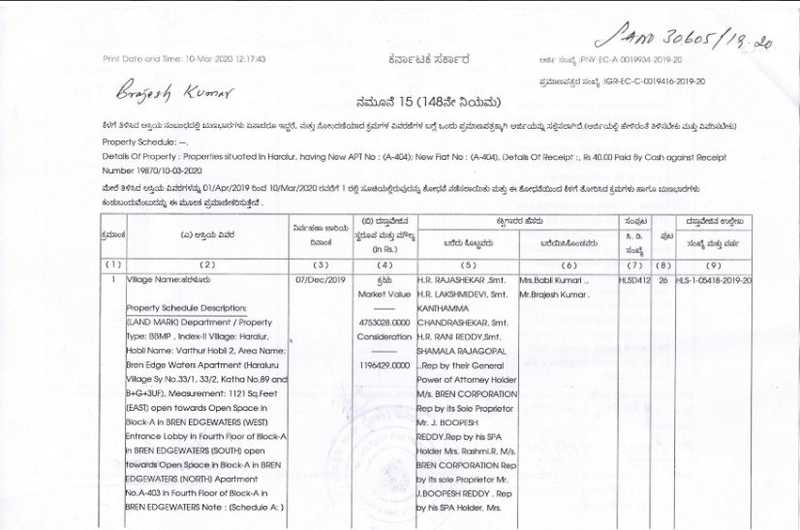

Process of Tracking the Status of Encumbrance Certificate Application Online in Karnataka
The steps to trace the status of your encumbrance certificate application are:
Step 1: Visit the Kaveri Online Services portal at https://kaverionline.karnataka.gov.in.
Step 2: Log in with your credentials.
Step 3: Select the ‘Online EC application’ option from the ‘Service Type’ section.
Step 4: Once the certified copy of the Encumbrance Certificate is accessible online, you’ll be able to download it.
Other Facilities available with KAVERI Online Services
- Encumbrance Certificates (EC)
- Stamp Duty Calculator
- Pre-registration Data
- Sub-registrar Office Locator
- Appointment Booking
- E-stamp Paper
- Agricultural Loans
- Online Commencement Certificate
- Know Your Property Valuation
Transactions that may not reflect on the EC are:
- Equitable Mortgage Deed
- Old Encumbrance Certificate
- Private Deals
In simple terms, any deals or transactions that not registered with the Sub-Registrar Office will not reflect in the Encumbrance Certificate.
Importance of Getting an Encumbrance Certificate
- The Encumbrance Certificate is an important document to purchase any land or property in India as it is a proof of ownership title. Therefore EC is required for the transfer of property.
- Apart from the purchase of property, an encumbrance certificate has to be produced when applying for a loan against the property in a bank or financial institution as it confirms that the property is free from any legal disputes.
- This certificate requires updating the land tax record if the property or land tax is not paid for more than three years.
- The Encumbrance Certificate is an important document for committing a mutation of property (Khata Registration/Khata Transfer/Patta).
Properties of Encumbrance Certificate
- An encumbrance certificate records the following property-related details:
- The certificate contains the property owner’s name
- The certificate is usually related to a specific period, and transactions related to the relevant asset for that period will be considered.
- Transactions and documents that have been registered with the office will be reflected in the Encumbrance Certificate.
- The certificate will explain the transaction date and details, volume number, book number, document number, and the name of the parties to the transaction.
- This document provides a complete description of the property as given in the Sale Deeds.
- If the land has been purchased on a loan, this certificate will contain details about the mortgage.
Documents Required for Obtaining Encumbrance Certificate
- Application form
- Attested copy of address proof
- A photocopy of any previously executed deed of the said property such as sale deeds, gift deeds, partition deeds, release deeds, etc.
- Details about the property and its title details
- The registered deed number, date, book number, volume/ CD number, and signature of the applicant should be affixed with it.
- Period for which the EC is required
- The purpose for which the EC is applied for
- Copy of Power of Attorney, in case of application, is made by the attorney holder
- Aadhar card
- Property card if available
Applicable Fees for Getting an EC
Obtaining an encumbrance certificate in Karnataka entails the following charges.
| Application fee | Rs 5 |
| For the search of the first year | Rs 30 |
| For every subsequent year | Rs 10 |
Processing Period for Getting an EC
The computerized format in sub-registrar’s offices enables us to quickly obtain the attached certificates within 2-3 working days.
Eligibility Criteria for Getting an EC
- Those who own lands in their name.
- The applicant intends to buy the land
- Authorized signatory/power of attorney.
Office Locations & Contacts in Bangalore
Sub Registrar Corporate Office,
Ambedkar Veedhi, Sampangi Rama Nagar,
Bengaluru, Karnataka 560009
Deputy Secretary to Govt. (Land Grants & Land Reforms)
Room No. 526, 5th Floor, Gate – 3, M S Building,
Dr. B.R. Ambedkar Veedhi, Bangalore – 560001.
Land Line : +91 080-22251633
Email ID: prs.revenue@gmail.com
Website – https://kaverionline.karnataka.gov.in
Check State Wise Encumbrance Certificate
| Kerala Encumbrance Certificate | Andhra Pradesh Encumbrance Certificate |
| Telangana Encumbrance Certificate | |







